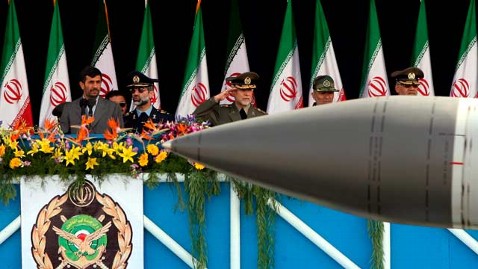Fear of Israel War With Iran Grows Amid Heightened Nuke Concerns

(Image Credit: © ABEDIN TAHERKENAAREH/epa/Corbis)
Iran's supreme leader raised the stakes today defiantly vowing that if Israel attacks Iran's nuclear program, American interests would suffer as well.
Some American officials believe Israel may be planning to strike Iranian nuclear targets sometime this spring. U.S. Defense Secretary Leon Panetta did not dispute a Washington Post story Thursday reporting his belief that Israel could attack as early as April, May or June. The story for the first time publicly pinned a specific timeframe to what has been an ongoing concern for the U.S. national security team.
Iranian leader Ayatollah Ali Khamenei told Iranians today that if his country is attacked, it would be "ten times worse for interests of the United States" than it would be for Iran.
In a fiery sermon, the defiant leader told Iranians that the country would not hesitate to retaliate if its nuclear facilities are attacked. He gave much of the speech in Arabic - even though Iranians don't speak Arabic - in a clear signal to leaders of the Arab world that Iran would not hold back and that those countries would be held accountable if such an attack by Israel took place.
"Threatening Iran and attacking Iran will harm America," Khamenei said. "Sanctions will not have any impact on our determination to continue our nuclear course … In response to threats of oil embargo and war, we have our own threats to impose at the right time."
Israeli facilities in North America - and around the world - are on high alert, according to an internal security document obtained by ABC News that predicted the threat from Iran against Jewish targets will increase.
Amid a threat of retaliation from Iran, Panetta today said that the United States is "prepared to respond if we have to," but behind the scenes, the United States has urged Israel not to attack. U.S. leaders still feel that international sanctions against Iran will pressure them to back down from their nuclear program and will be more beneficial in the long term.
But Israelis feel that Iran is developing nuclear arsenal at such a rapid pace that Israel will soon run out of time if they don't act now.
"For the Israelis, time is running out sooner because their military capabilities are more limited. So over the next six months the odds are pretty good that if they are not convinced they will take action," said Matthew Kroenig, a fellow at the Council on Foreign Relations and an assistant professor of government at Georgetown University. "Israel is calculating that in the next six months their window of opportunity for a strike will close. So it's now or never."
In December, Panetta warned of the devastating consequences for the United States if such an attack is carried out. Fresh out of Iraq and embroiled in an expensive war in Afghanistan in a weak economy, there is little appetite for another costly foreign engagement.
"The indication is that at best it [an Israeli strike] might postpone it maybe one, possibly two years," Panetta said, referring to Iran's eventual development of a nuclear device. "Frankly, some of those targets are very difficult to get at."
Panetta also warned of "unintended consequences" of such an attack.
"Ultimately it would have a backlash and the regime that is weak now, a regime that is isolated would suddenly be able to reestablish itself, suddenly be able to get support in the region, and suddenly instead of being isolated would get the greater support in a region that right now views it as a pariah," he said.
"Thirdly, the United States would obviously be blamed and we could possibly be the target of retaliation from Iran, striking our ships, striking our military bases. Fourthly there are economic consequences to that attack, severe economic consequences that could impact a very fragile economy in Europe and a fragile economy here in the United States.
"And lastly I think that the consequence could be that we would have an escalation that would take place that would not only involve many lives, but I think could consume the Middle East in a confrontation and a conflict that we would regret," Panetta said.
President Obama sent a letter last month to Khamenei via Iran's United Nations ambassador, which Iran says both threatened against shutting down the Strait of Hormuz and also invited Tehran to hold talks.
Khamenei said today that Iran's response to Obama's letter will be made public soon.
Another war, even if it's started by a U.S. ally, would present both an international and domestic challenge to Obama, who is up for reelection in November.
Experts say the country will likely unite behind Israel if it were to make a move, but the monetary cost and the threats to U.S. facilities would be grave.
Obama has already been assailed by some Republican candidates for not taking a more aggressive approach towards Iran.
"This is, of course, President Obama's greatest failing, from a foreign policy standpoint, which is he recognized the gravest threat that America and the world faced as - and faced was a nuclear Iran and he did not do what was necessary to get Iran to be dissuaded from their nuclear folly," Republican front-runner Mitt Romney said in November.
The former Massachusetts governor has said he would support military action "if all else fails."
"It is unacceptable for Iran to have a nuclear weapon. We will not allow Iran to have a nuclear weapon," he said.
Former House speaker Newt Gingrich supports "a maximum covert operation to block and disrupt the Iranian nuclear program" and "breaking the regime and bringing it down," but agreed with Romney that he would also support military action if needed.
Rep. Ron Paul is the only one among the four remaining GOP candidates who oppose such an engagement.